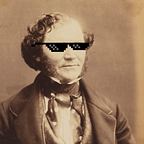A cuppa and the codebreakers
Among my friends, a common joke, when discussing slightly idiosyncratic research topics, is ‘teacups’. This was because, as a part of my Doctoral dissertation (and subsequent book), I spent a good deal of time researching crockery. My research was on the bureaucracy of Britain’s now famous cryptanalysis bureau, the Government Code and Cypher School (GC&CS) headquartered at Bletchley Park during the Second World War.
What, you might reasonably ask, does crockery have to do with wartime Signals Intelligence? Well, the answer is nothing. But understanding crockery does have a very great deal to do with understanding bureaucracy. When GC&CS first started migrating from its London offices to Bletchley Park (BP) in September 1939 it sent a staff contingent of a little under 200 individuals. By the December of 1940 that figure had reached 600, by February 1942 over 1,500, and by December 1944 there were at least 8,000 employees working at BP.
These huge staff numbers were needed for all manner of work, from cryptanalysis and translation of intercepted messages, to processing the vast quantities of information accrued, to operating hundreds of cryptanalytical and cipher machines. Quite understandably, agency officials had realised that their workers needed to be both fed and watered. The provision of regular cups of tea was deemed essential to maintaining morale and failure to provide them was unthinkable.
This should come as no surprise, given the centrality of tea in British culture. As George Orwell wrote in 1946, ‘tea is one of the main stays of civilization in this country, as well as in Eire, Australia and New Zealand’. He further added that Indian tea (as opposed to Chinese tea) had clear, beneficial qualities and that people ‘feel wiser, braver or more optimistic after drinking it’. Given its importance, tea was swiftly placed on the ration and remained restricted until 1952. In 1945, the tea ration was 2 oz a week.
Meanwhile, government organisations and private businesses, if they wanted a happy, functional workforce, also supplied tea. This was all the more pressing in large organisations where essential work was conducted by a harried workforce operating around the clock. Bletchley Park was just such a place. Staff worked on gruelling shift system, 8am to 4pm, 4pm to midnight, and midnight to 8am. Their shifts would change every two weeks, making the establishment of any kind of normal sleeping pattern impossible. These people expected their regular cup of tea, a small mercy at a difficult time, and their managers were definite in their efforts to make sure they got it.
This was a problem from the very outset of the war. Not only did the agency need to supply the tea, but it proved a struggle to maintain enough cups and saucers. In February 1940, a memo was circulated to staff informing them that, owing to losses, they had to supply (apparently temporarily) their own crockery. Such losses were a constant problem throughout the war and one manager, Captain W. H. Ridley, rebuked staff complaining that items of crockery had been ‘found pushed into the shrubberies and left about in offices, many of them broken.’ Moreover, he chastised them that the loss of crockery was five times that of what was to be expected on a Man-of-War, and that it had become necessary to prohibit taking government property from the Mess.
Such was the frequency that crockery was lost, some staff members turned to extreme measures to protect their own cups and mugs. The famous cryptanalyst, Alan Turing, was so exasperated with people taking his cup, he chained it to the radiator by his desk. Items would also go missing for odd reasons. Another legendary codebreaker, Josh Cooper, would stand in front of the small lake on the Bletchley Park estate drinking his tea, deep in thought. Once finished with his tea, apparently unsure what to do with his cup, he would fling it into the lake.
cc-by-sa/2.0 — © David Dixon — geograph.org.uk/p/5111837
Of course, given the number of staff, volunteers and professional caterers at BP had their work cut out. Staff would have to leave their huts and visit the Dining Hall, but such was the demand that the volunteer staff on cuppa-tea-production duties were overwhelmed. This was a time-consuming business, so managers instead decided to install tea urns in the various huts around the park.
Given the number of staff, the provision of tea was also an expensive proposition. As a result, in 1941, a charge of 1 1/2 d was applied to each cup of tea. Yet this created its own problems overwhelming the Dining Hall porters, staff forgetting to pay their subs and so on. Very much in keeping with BP’s general approach, it was eventually decided that a mechanised system would need to be introduced to resolve this problem. Just as machines were used to crack ciphers, machines would be used to crack the problem of tea payment and ticket machines were installed.
In many ways the provision of tea is a parable for understanding Bletchley Park as a whole. The Organisation Theorists, Professors Christopher Grey and Andrew Sturdy, described BP’s organisation as ‘a chaos that worked’. Part of the reason it was so chaotic was the rapid rate of growth which presented huge logistical problems, this was created by the sheer ambition of the agency’s project — to read tens of thousands of German messages each week. Every time a problem threatened to overwhelm them, they devised a new solution on the fly.
Often lost in histories of the agency, Bletchley Park was a monumental exercise in frenetic bureaucratic firefighting and was an organisation characterised by its ad hoc development. One need only look to the heroic efforts by catering staff and volunteers, in the face of adversity, to ensure that every staff member who wanted a cup of tea got one.
